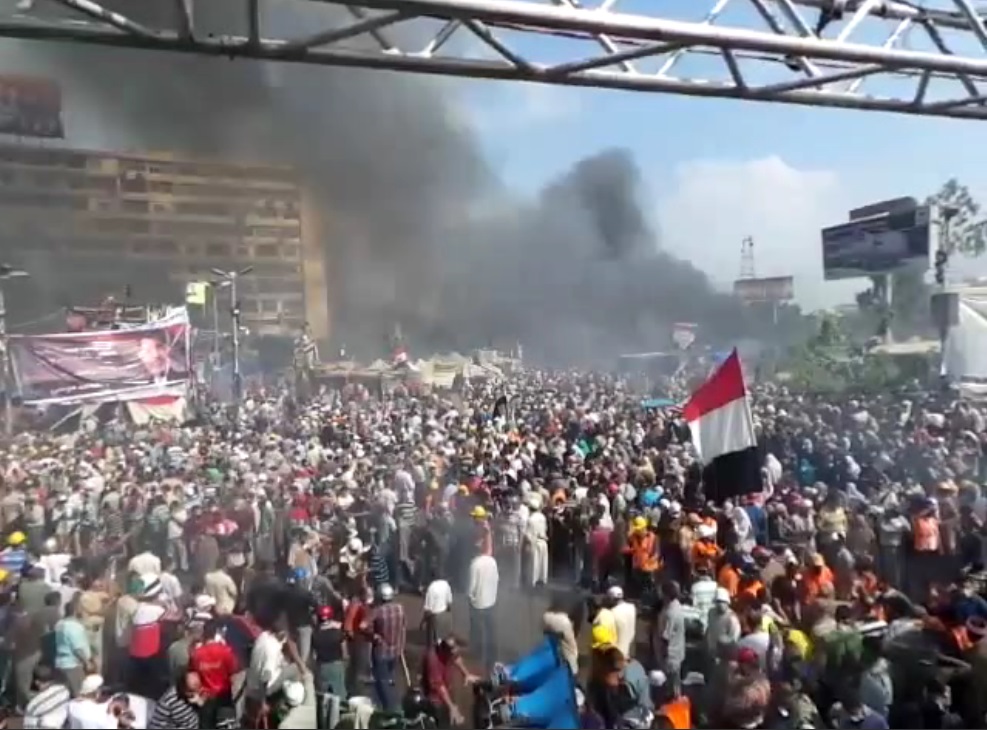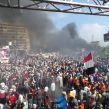
Coming to Grips with Terrorism in Egypt a Year after the Raba’a Square Massacre
Publication: Terrorism Monitor Volume: 12 Issue: 17
By:

Before the June 30, 2013 coup that overthrew Muhammad Mursi, Egypt’s first civilian elected president, terrorist operations in Egypt were far fewer in number and scale, focusing mainly on blowing up gas pipelines supplying Egyptian gas to neighboring Israel. However, after the violent crackdown on Muslim Brotherhood supporters orchestrated by then-Defense Minister Abd al-Fatah al-Sisi in the summer of 2013, radicalism became viewed as the only means of expressing critical views of the political system.
This rise in terrorism enabled al-Sisi to strike fear amongst grassroots Egyptians and pose as a national savior despite excluding all peaceful ways of dissent and arguably provoking much of the violence that followed the Raba’a, Nahda and the Abu Zaabal massacres in 2013.
In the midst of such a polarized situation, it was easy for al-Sisi to become president in June 2014 and begin the return of the country back to a Mubarak-style regime. Yet, even during Mubarak’s iron-fisted rule in a seemingly stable country, terrorism did exist and his strong police state could not eradicate the influence of Saudi-style Wahhabist Islam.
Amidst the tug-of-war between al-Sisi’s plan to create stability and terrorist acts aimed at striking such stability based on an “illegitimate coup,” al-Sisi ignored political solutions based on adopting a democratic approach and giving a space for opposition voices in order not to give radical Islamists an excuse to launch retaliatory attacks against police and soldiers. Al-Sisi instead tried to fix the deteriorating economy by cutting the energy subsidy – an explosive issue that no previous president had dared address. However, such a solution could only achieve stability in the short term so long as the current government ignores the fact that the product of its violent crackdown is new victims who are easily recruited by radical groups. Even if they do not have the same capability as Sinai’s Ansar Bayt al-Maqdis, these groups can still form a nucleus for extremism and will eventually threaten the nation’s security.
As al-Sisi took advantage of the unprecedented crackdown, radical groups, topped by Ansar Bayt al-Maqdis, found the military brutality against Islamists created fertile soil to recruit new jihadists, ranging from Salafi conservatives to Islamist victims of random arrests by the security forces. The rise of regional extremist groups such as the Islamic State of Iraq and Syria (ISIS) – would also prove an asset in enabling the extremists to survive repeated and ongoing military strikes. The result was an intensification of terrorist attacks in Egypt and a new ability to recruit operatives at local and global levels (al-Ahram [Cairo], April 11).
As the anniversary of the Raba’a massacre arrived on August 14, Egyptian media outlets were abuzz with a video released by an armed group self-described as the “Armed Brigade of Helwan” (Helwan is an Egyptian city just south of Cairo). In the video, 12 masked men in black carrying machine guns in a street displayed the four-finger gesture commemorating the Raba’a massacre while their spokesman announced: “We’re tired of the pacifism of the Muslim Brotherhood.” [1] Though the group criticized the Egyptian armed forces, its ire was directed primarily at the Interior Ministry: “This is a warning for the Interior Ministry… You are all targeted.”
Members of the armed group were arrested on August 26, with local media displaying a photo of the group’s 34-year-old founder, Magdy Fonia, who confessed he espoused the Muslim Brotherhood’s ideology and had led pro-Brotherhood protests in the Helwan region. Fonia was reported to have recruited 12 people and trained them in a desert area near Cairo on how to use guns to fight police and soldiers (al-Wafd [Cairo], August 26; Ahram Online [Cairo], August 30).
In the Egyptian media, various strategic experts claimed that the brigade is evidence that the Muslim Brotherhood is pointing weapons at the state and must be charged with treason, another explained that slum areas are incubators for the spread of radical ideology, while others said the video release is meant to distract attention from a recent Human Rights Watch report which called for Egypt’s top military brass to be investigated over the killing of more than a thousand mostly unarmed protesters in Cairo last year, describing the August 2013 mass killings in Raba’a and Nahda squares as likely amounting “to crimes against humanity” (al-Shorouk [Cairo], August 18). [2]
A Muslim Brotherhood website recently published a statement by the Anti-Coup Pro-Legitimacy National Alliance that reminded people of the massacres committed by the military, emphasizing the importance of continuing the revolutionary wave: “Despite fascist coup terror, the popular resistance moves forcefully forward without abandoning its established principles, committed to its peaceful path and the right of self-defense… The revolution will certainly triumph and the people will certainly bring to trial all those involved in the horrific atrocities inflicted on this homeland’s citizens.” [3]
Nonetheless, Fahmy Howeidy, a moderate Islamic intellectual, has suggested that Egyptian state security benefits from the presence of terrorist organizations, given that the support for the current government is based, in no small part, on perceptions about the constant threat of terrorism in Egypt (al-Shorouk [Cairo], August 18).
Al-Sisi’s government could seek more radical solutions to dismantle the network of terrorism by giving a space for critical voices within the context of a policy that respects human rights, freedom of speech and the rule of law. Oppression will bring more violence and history tells that Islamist extremism began in Egypt when former president Gamal Abd al-Nasser cracked down on the Islamists in 1954, after which the once-limited violence practiced by the Muslim Brotherhood expanded to large-scale violence by offshoots of the group, including al-Gama’a al-Islamiya and Egyptian Islamic Jihad.
Muhammad Mansour is an highly accomplished investigative journalist who covers a broad range of topics related to Egyptian politics and global affairs.
Notes
1. Please see https://www.youtube.com/watch?v=-OQMPeJk60U.
2. “Rab’a Killings Likely Crimes against Humanity,” Human Rights Watch Report, Egypt, August 12, 2014, https://www.hrw.org/news/2014/08/12/egypt-rab-killings-likely-crimes-against-humanity.
3. “Egypt Pro-Legitimacy Alliance: Reign of Terror Will End Soon,” The Anti-Coup Pro-Legitimacy National Alliance, Cairo, August 16, 2014, https://www.ikhwanweb.com/article.php?id=31754.





